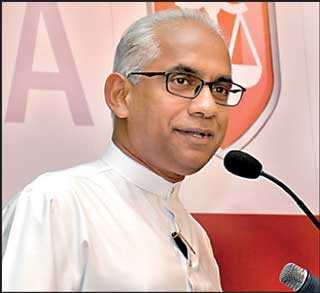Sunday Feb 22, 2026
Sunday Feb 22, 2026
Wednesday, 31 July 2019 00:26 - - {{hitsCtrl.values.hits}}
By Chathuri Dissanayake
The Commission to Investigate Allegations of Bribery or Corruption (CIABOC) is set to present new legislation to address loopholes in existing laws, to help fight bribery and corruption.
 |
State Minister of Finance Eran Wickramaratne - Pic by Lasantha Kumara |
The proposed legislation, now with the Legal Draftsman, is at its final stage, with plans to be presented before the Sectoral Oversight Committee Legal Affairs (anti-corruption) and Media on 9 August. The draft will then be sent to the Cabinet for approval before being tabled in Parliament, CIABOC Director General Sarath Jayamanne PC told Daily FT, on the side-lines of the forum on ‘Role of Finance Professionals in Combating Bribery and Corruption’, organised by CA Sri Lanka together with the South Asian Federation of Accountants.
“Asset declaration law, bribery law and the CIABOC law, there are three pieces of law, all those have been there for the last 35 to 40 years and not a word has been amended. We are putting everything together and have drafted a composite law with separate parts. Each part will be incorporated,” he said.
The proposed legislation will include new laws which will address lacunae in the existing legislation, including introduction of legislation to address private sector bribery, and updating the Declaration of Assets and Liabilities Law.
The proposed law will also give power to CIABOC to engage in preventive measures, giving it authority to insist on institutions changing their systems and procedures to prevent bribery and corruption, and take action under the National Action Plan for Combating Bribery and Corruption in Sri Lanka.
The law, if passed will also give provisions to set up a separate directorate under CIABOC for asset declaration, which would be online. The directorate will also have powers to carry out verification processes and forward any suspicious cases to CIABOC, Jayamanne said, explaining the key features of the new legislation.
Currently, the Declaration of Assets and Liabilities Law does not have requirements to declare income or expenditure during the year, which CIABOC aims to address in the new law.
“If you earn and spend illicit money within the year before 31 March of the year, that is not covered there, you are not required to divulge under the current law,” he said.
Speaking at the forum, Jayamanne pointed out that the existing laws, which have not been amended to address modern day requirements, have loopholes which leave room for fraud and corruption.
Further, he also noted that the current Government, which came into power on the promise of addressing bribery and corruption, did not have a “vision of how it should be done”.
“I am not sure if they had done any research prior to this commitment,” he said, adding that absence of stringent laws made it difficult to take action against wrongdoers. Further, lack of proof also made the prosecution harder, which was worsened by the resource limitation, he said.
However in 2017 the CIABOC was given powers to amend three pieces of legislation, the Declaration of Assets and Liabilities Law, Bribery Act, and Bribery Commission Act, which were last amended 1994, he told the audience.
As a result, a new law has been drafted which would also enable the filing of asset declaration on an online platform, with plans to making the declaration accessible to public with restrictions on certain personal information, he said. This would then address the current restrictions on publicising asset declarations on Members of Parliament, which is filed to the Speaker, and those of Cabinet Ministers, which are filed with the President’s office.
The proposed laws will also address conflict of interest in holding public office, which has not been addressed to date, he said.